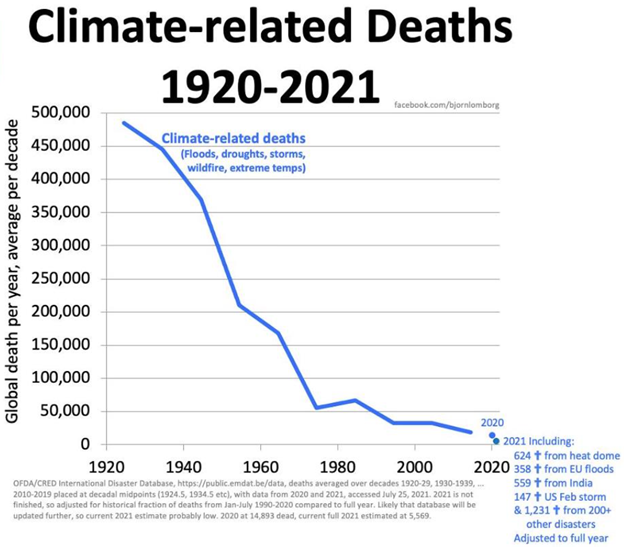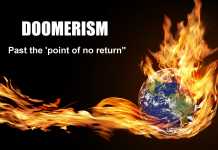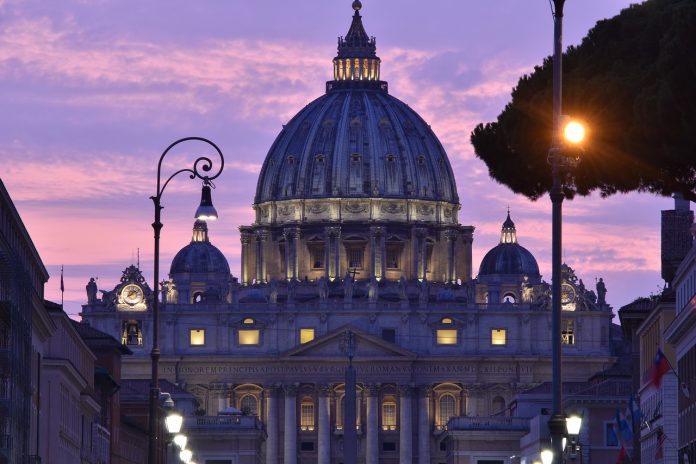Many mainstream media outlets, like CNN and the Public Broadcasting System (PBS), and trade or specialty journals, like Inside Climate News, among numerous others, were quick to publicize and endorse a recent teaching document issued by Pope Francis, Laudate Deum (‘Praise God’). The press reports especially focus on the criticism Pope Francis leveled at the Western world’s heavy energy use and its alleged contributions to warming. The Pope’s claims about climate change and market economies are misinformed and flawed. Evidence shows that contrary to the Pope’s assertions extreme weather is not worsening, that current rates of warming are not outside the historical norm, and that there has been no real increased in fluctuations between weather extremes that can be blamed on supposed human-caused climate change. Additionally, his solutions, namely a rapid energy transition, global de-prioritization of economic growth, and the implied need to sacrifice the Western standard of living, will not only fail to stop climate change, but will lead to further human and ecological suffering.
Laudate Deum is the second environment-focused encyclical issued by Pope Francis, and compared to the first, Laudato Si, has its primary focus on the issue of climate change. It also was written in much stronger language, highlighting the lack of “progress” on advancing the goals of the numerous U.N. Intergovernmental Panel on Climate Change (IPCC) conferences.
“Despite all attempts to deny, conceal, gloss over or relativize the issue, the signs of climate change are here and increasingly evident,” Pope Francis writes in Laudate Deum. “No one can ignore the fact that in recent years we have witnessed extreme weather phenomena, frequent periods of unusual heat, drought and other cries of protest on the part of the earth that are only a few palpable expressions of a silent disease that affects everyone.”
He lists a bevy of other alleged problems caused by climate change, including polar ice and glaciers melting, ocean acidification, changes in ocean currents, and more, which cannot all be debunked in a single Climate Realism post, but have been many times over in previous posts.
Pope Francis’ claim that extreme weather is getting worse over time has no data to support it. While there may be the appearance of more frequent weather disasters around the globe, this is actually most likely an artifact of media coverage and focus, and our ability to instantly obtain news from everywhere in the world thanks to the internet.
The IPCC’s own documents confirm what one recent study discussed on Climate Realism, found “on the basis of observational data, the climate crisis that, according to many sources, we are experiencing today, is not evident yet.” The IPCC’s most recent summary documents admit that there is low scientific confidence in the existence of any visible “global warming” effects in the form of most of the weather extremes that alarmists frequently cite as evidence.
Even better news is that human casualties due to climate-related disasters like wildfires, floods, and extreme hot/cold temperatures, have been declining worldwide over time, even as the world modestly warms.

The sharp decline in weather related deaths is largely a result of improvements in agriculture, medicine, access to emergency services, infrastructure, electricity, indoor climate control, and other developments—all of which come thanks to our continued use of fossil fuels, as discussed in Climate Realism posts here, here, and here, for example.
This brings us to Pope Francis’ criticism of the Western lifestyle and heavy energy and fossil fuel use.
There is one part of the encyclical that makes an interesting point, that industrial projects that will contribute to local pollution are sometimes undertaken in an area only after the local residents are fed marketing ploys, promises, and “false information.”
People are promised economic benefits, Francis writes:
Yet in reality there does not seem to be any true interest in the future of these people, since they are not clearly told that the project will result in the clearing of their lands, a decline in the quality of their lives, a desolate and less habitable landscape lacking in life, the joy of community and hope for the future; in addition to the global damage that eventually compromises many other people as well.
This precise scenario applies to the peddlers of so-called “green energy” much more than to fossil fuel development, at least outside of countries where corrupt governments claim ownership and control of the development of fossil fuels, doling out the benefits to their unscrupulous regimes and their crony allies while denying local people property rights in resources.
An “energy transition” will require tons of land to be cleared for growing biofuel feedstock, placing solar panels and battery storage installations, and wind power plants. Not to mention the mining required to provide the minerals for those technologies, mining often carried out under inhumane conditions using child and slave labor. In addition, Pope Francis has seemingly not considered the land and resources still required to backup “renewable” power sources, which all have larger environmental footprints than traditional energy sources, even including the mining or drilling involved.
The human cost is expansive as well; fossil fuels have provided the transportation fuel as well as materials for infrastructure that make modern life possible, and are contributing to lifting Earth’s poor out of penury. Green energy, on the other hand, greatly expands the need for rare earth minerals and materials like cobalt, the mining of which famously involves the abuse of children and slave labor. Francis may be ignorant of the fate of those forced into working in the green energy supply chain, but if he is aware, he should have factored these issues into his pronouncement.
The solution presented by Pope Francis is, in practice, nothing more nor less than a “degrowth” agenda, and though he insists that the world’s poor need to be considered, the world’s governments, the World Economic Forum, and international banking structures, evince no real concern for helping the world’s poor by pushing these retrograde “net zero” policies. On the contrary, the international green agenda has so far resulted in more poverty and, as in the case of in the case of Sri Lanka, famine and violence.
There are two things that the Pope is correct about in Laudate Deum, and that is that human beings should be good stewards of the environment, and that human beings and our activities are not an inherent danger to the planet. Population control, the Pope argues, is not a reasonable solution to environmental problems. This is correct. It is notable that the media and the activists touting his statement ignored this part of the encyclical. Unfortunately, Pope Francis does not seem to realize that the activists who have influenced his perspective on climate change embrace severe population control. Their view is that the world has too many people using too many resources.
If climate change was in fact catastrophic, or endangering the planet and human life, the Pope’s concerns would be warranted. However, his proposed rejection of markets and fossil fuel use a means of solving the climate crisis, would still be not just be unjustified but positively dangerous to continued human flourishing. Fortunately, data does not support the Pope’s fears. The best case going forward would be if he obtained some more moderate advisors on his science team. Science does in fact have moral implications, but it is vitally important that all the facts are known, especially since the prescribed cures for climate change are so dangerous to human life.

















What amazes me is all the effort to move over into an embryonic technology that is costly and based on conversion of electrical energy directly from mechanical energy without using the “heat” cycle which has been the primary system of energy conversion since the dawn of the industrial revolution.
Where is the emphasis on nuclear fission and fusion reactors, which traditionally use the thermal heat cycle (steam turbines) to convert heat energy to mechanical, et al electrical?
There have been tremendous breakthroughs on fusion reactors in the recent past. They will probably be viable in as little as twenty years. In the meantime, breeder reactors can make lots of fissionable plutonium, not being done now due to fear of diversion to weapon applications. These reactors with modern reliable and safe control systems can do it now. Why are they being ignored?
There are EU countries, such as France, which derives over 50% of its electrical energy from fission reactors. It uses the traditional heat cycle conversion.
Then also, where is the all the interest in “cogeneration”? When using the heat cycle to convert heat energy to mechanical (electrical), 60% is waste heat. That’s the best the conversion can do. Why do we not want to capture that 60% of waste heat (which cannot be used for mechanical conversion). It’s now mostly discharged into the environment through cooling towers and large bodies of water, where generation plants are normally located.
Why not install NG gas turbines in large structures such as huge skyscrapers in cities or centrally in large urban areas. The waste heat can easily be distributed and used for water heating, and air condition as well as comfort heating during the winter months. Why do we ignore the fact that 60% of the energy generated by fossil fuels is now just discarded and then affix our myopic gaze to a technology that can’t even give us 10%?
The two conclusions that i can come up with is: (1) dysfunctional mentality, or more likely (2) sinister intend to do irreparable harm to the world’s largest economy for promulgating a diabolical political agenda.